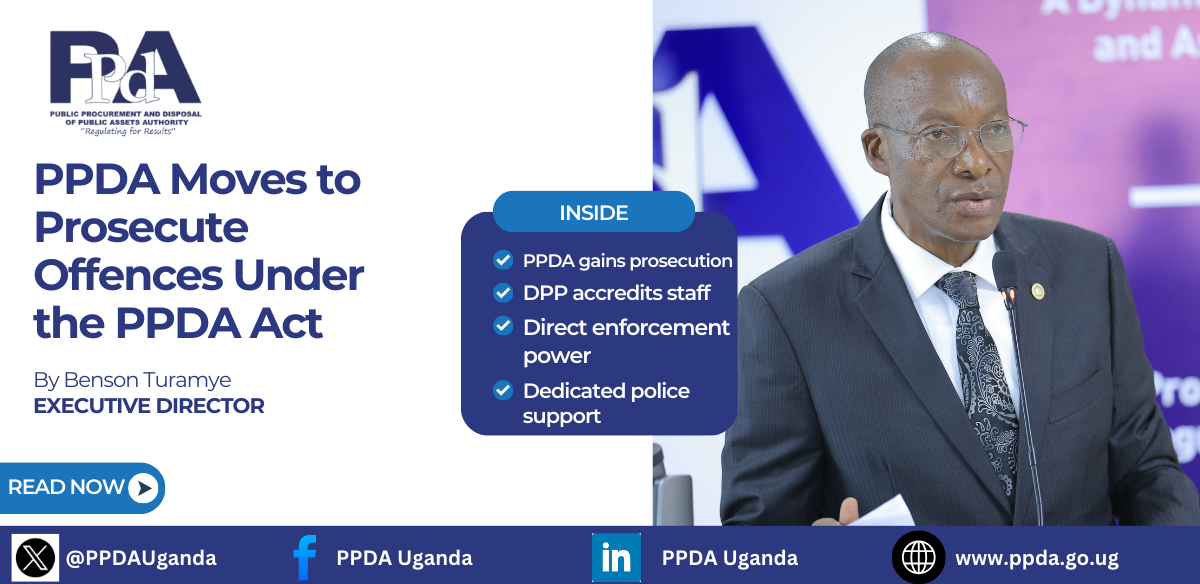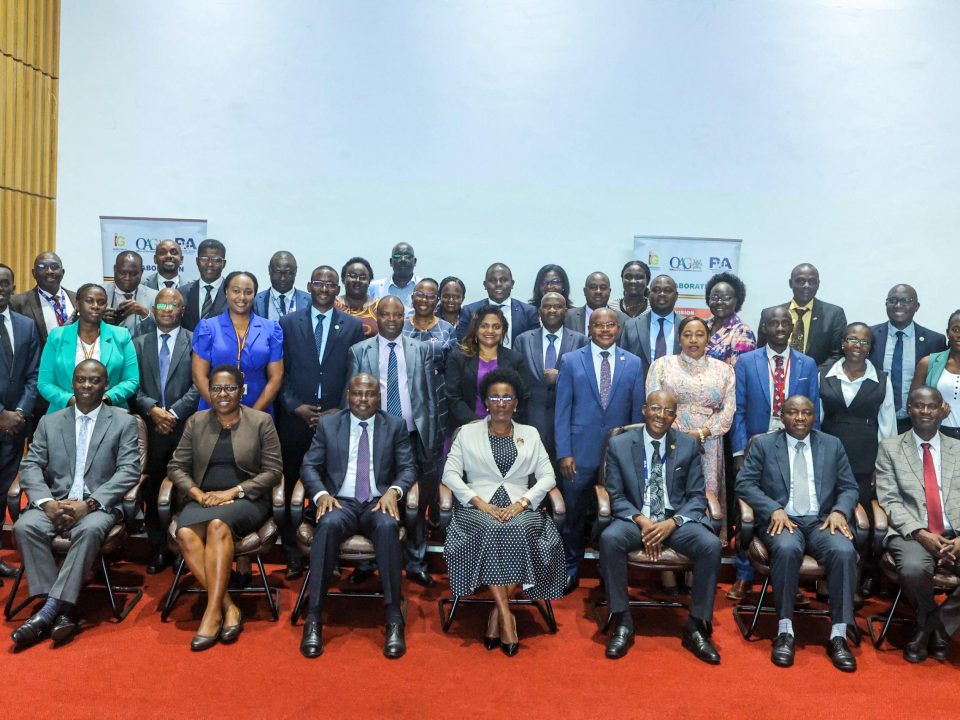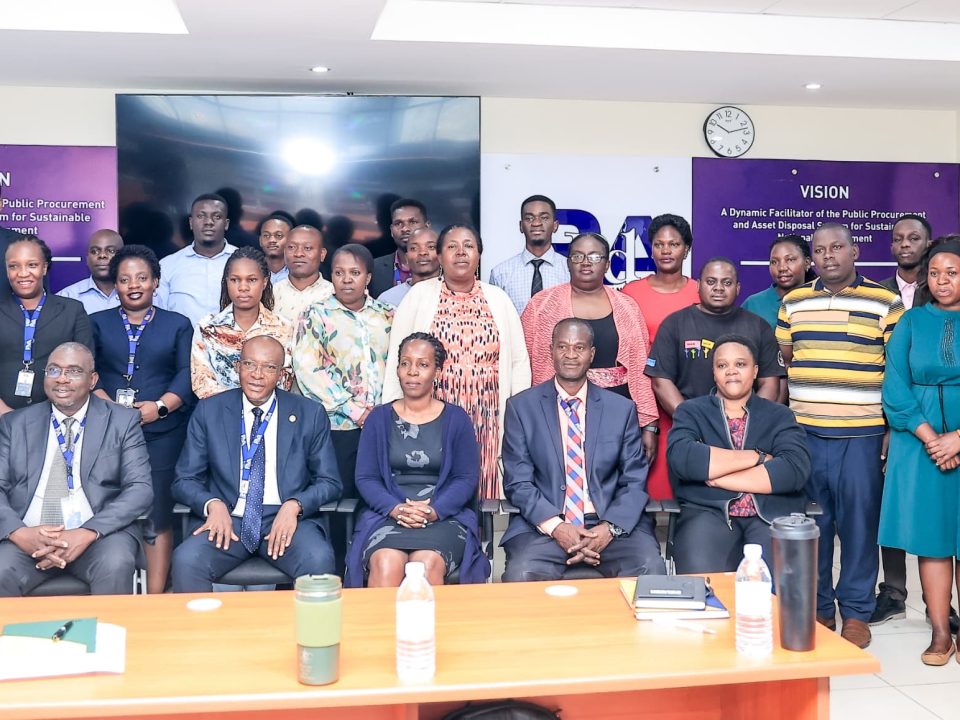PPDA Moves to Prosecute Offences Under the PPDA Act

PPDA Onboards ACCU and UDN onto the Contract Monitoring System
August 5, 2025
Safeguarding Public Resources: Uganda’s Watchdog Institutions-PPDA, OAG, and IG- Deepening Collaboration Against Corruption
September 25, 2025PPDA Moves to Prosecute Offences Under the PPDA Act
By Benson Turamye
In a landmark development aimed at strengthening accountability and enforcing compliance in public procurement, the Public Procurement and Disposal of Public Assets Authority (PPDA) has been empowered to prosecute offences under the PPDA Act, Cap 205.
The development follows a decision, earlier this year, by the Director of Public Prosecutions (DPP) to accredit staff from PPDA legal chambers as public prosecutors. The move marks a major shift in the Authority’s enforcement powers and underscores government’s commitment to rooting out procurement malpractice in Uganda’s public sector.
This development is not only lawful—it is transformational. Under Article 120(4) of the Constitution, the DPP is empowered to delegate prosecutorial functions to qualified officers, and under Section 223(2) of the Magistrates Courts Act, public servants can be appointed prosecutors through a formal instrument. By invoking these provisions, the DPP has elevated PPDA from a largely recommendatory agency to one with real enforcement power.
Previously, according to Section 10 of the PPDA Act Cap 205, when PPDA uncovered wrongdoing—be it illegal contract signing, bid rigging, or failure to adhere to procurement procedures—our recourse was limited. The Authority could only issue directives, propose disciplinary measures, or recommend sanctions to a “competent authority.” Too often, these recommendations were, delayed and not given due priority.
Thus, the actual prosecution process remained out of reach. Enforcement, in essence, was indirect, bureaucratic, and toothless.
Additionally, the Authority was required to report annually on its findings, the measures it recommended, and the responses received. While this transparency provided some accountability, it lacked the cutting age and deterrent effect of direct legal consequences.
The decision by the DPP to grant prosecutorial powers to PPDA staff is therefore a game-changer. With this mandate, PPDA can now take action against individuals that violate public procurement laws, without waiting on external agencies to initiate proceedings.
Under its new powers, PPDA will be able to prosecute a wide range of procurement-related offences, under Section 129 of the PPDA Act, including:
Failure or refusal to provide required documents, reports, or information to the Authority;
Non-compliance with summons, including refusal to give evidence or produce relevant records;
Attempting to influence or interfere with PPDA or PDE officials;
Collusion or corruption in the procurement process;
Obstructing officials performing their duties under the Act;
Unjustified delays in bid opening, evaluation, or contract award decisions;
Canceling a procurement process after contract award without legal basis;
Negligence that results in loss of public funds or assets;
Disregard for Tribunal rulings;
Entering into contracts where there is a clear conflict of interest, particularly involving insiders in the procurement decision-making process.
Connivance or collusion to commit a corrupt or fraudulent practice.
The Authority will also use this new mandate to broaden its enforcement scope and ensure that all individuals involved in procurement fraud face the full force of the law. Those liable for prosecution include Accounting Officers, members of Contracts and Evaluation Committees, staff of Procurement and Disposal Units, and private providers who use underhand methods to influence contract awards.
PPDA’s ability to prosecute will significantly enhance its deterrent effect and enable swifter resolution of cases. It also places Uganda’s procurement framework on a stronger footing, aligning it with international best practices where procurement oversight bodies have both regulatory and enforcement roles.
This move comes at a time when the country is investing heavily in infrastructure, oil and gas, and service delivery—sectors where procurement integrity is essential to ensure value for money and to avoid costly scandals.
It is important to acknowledge the commendable support of the Inspector General of Police, Abas Byakagaba, who acted promptly to back this initiative. As a result, the Authority will benefit from a dedicated police officer assigned exclusively to facilitate investigations into procurement-related offences.
The Authority does not operate on a fault-finding basis. Instead, with its expanded mandate, it encourages all Ministries, Departments, Agencies, Local Governments—as well as providers—to strictly comply with the PPDA Act and its regulations. Non-compliance will no longer attract just administrative sanctions, but shall now also result in criminal prosecution.
As the different sectors of the economy continue to up the efforts towards the ten-fold growth target, with key national projects, the empowerment of PPDA to prosecute procurement offenders is a timely and welcome reform—one that will infuse energy in accountability and discipline efforts the public procurement system needs. The message is simple: public procurement is a legal responsibility, not a personal opportunity. We are committed to our mantra; “Regulating for Results”. We now have the tools to hold offenders accountable—and we fully intend to use them.
-ENDS-
The writer is the Executive Director of the PPDA




